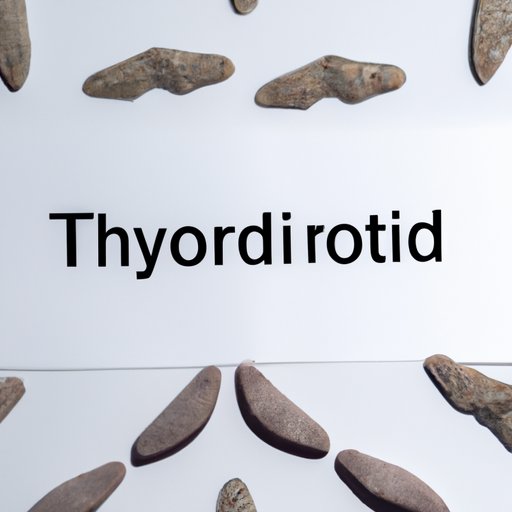
Introduction
Are you struggling to lose weight despite maintaining a healthy diet and exercising regularly? It can be frustrating when you are making an effort, but the numbers on the scale simply won’t budge. One possibility you may not have considered is an issue with your thyroid. In this article, we will explore the link between thyroid function and weight gain.
The Link Between Thyroid Function and Weight Gain: What You Need to Know
Before delving into the connection between thyroid function and weight gain, let’s first understand what the thyroid gland is and its functions.
The thyroid gland is a small, butterfly-shaped gland located in the neck. It produces hormones that regulate various bodily functions, including metabolism, heart rate, and body temperature.
The hormones produced by the thyroid gland are responsible for balancing the body’s metabolism. When the thyroid gland doesn’t produce enough hormones, known as hypothyroidism, it can lead to weight gain.
Why Your Thyroid Could Be the Culprit Behind Your Unexplained Weight Gain
Thyroid disorders can cause weight gain, even if you are consuming a healthy and balanced diet and exercising regularly. Here are some examples of how thyroid disorders can affect weight:
– Slowed metabolism: When there is insufficient thyroid hormone production, the metabolism slows down. This can make it harder for your body to burn off calories, leading to weight gain.
– Water retention: Hypothyroidism can cause the body to retain excess water, leading to weight gain.
– Increased appetite: Hyperthyroidism, the opposite of hypothyroidism, can lead to increased appetite and unintentional weight gain.
It’s important to note that even small changes in thyroid hormone levels can have a significant impact on weight.
Breaking Down the Science: How Thyroid Imbalance Can Lead to Weight Gain
To understand how thyroid imbalance can lead to weight gain, let’s take a more in-depth look at how thyroid hormones work in the body.
The thyroid gland produces two main hormones: thyroxine (T4) and triiodothyronine (T3). These hormones are responsible for regulating the body’s metabolism and energy levels.
When the thyroid gland produces too much of these hormones, known as hyperthyroidism, the metabolism goes into overdrive, leading to unintended weight loss.
On the other hand, when the thyroid gland doesn’t produce enough of these hormones, known as hypothyroidism, the metabolism slows down, making it harder to burn off calories and leading to weight gain.
The Role of the Thyroid in Bodily Functions, Including Metabolism and Weight Regulation
The thyroid gland plays a crucial role in regulating the body’s various functions, including metabolism and weight. It’s essential to maintain proper thyroid function to ensure that these processes run smoothly.
When the thyroid gland isn’t functioning properly, it can have far-reaching effects on bodily functions. For instance, hypothyroidism can lead to fatigue, constipation, and depression.
Demystifying Thyroid-Related Weight Gain: What Your Doctor Might Not Be Telling You
Despite the link between thyroid disorders and weight gain, there are still many misconceptions surrounding this issue. It’s not uncommon for some doctors to overlook thyroid-related weight gain, focusing instead on diet and exercise.
This oversight can have far-reaching effects, as untreated thyroid disorders can cause a host of other health issues.
How to Address Weight Gain Associated with Thyroid Issues: Diet, Lifestyle, and Medical Solutions
The good news is that there are many options available for addressing thyroid-related weight gain. These include:
– Diet: A healthy and balanced diet can help manage weight gain associated with thyroid disorders. Eating a diet rich in lean protein, whole grains, and fruits and vegetables can help regulate the body’s metabolism.
– Lifestyle changes: Regular exercise can help improve your thyroid function and regulate your metabolism. Practicing stress-management techniques, such as deep breathing and meditation, can also help.
– Medical solutions: Thyroid hormone replacement therapy is a common treatment for hypothyroidism. This therapy involves taking medication to replace the hormones that your thyroid gland isn’t producing enough of.
Conclusion
In conclusion, if you are experiencing weight gain despite your best efforts to maintain a healthy lifestyle, it’s essential to rule out any underlying medical issues, such as thyroid disorders. Consult with your doctor if you suspect that your thyroid function might be behind your weight gain.
Maintaining a healthy thyroid function is crucial for overall health and well-being, and addressing any issues early on can help prevent further health complications down the line.


